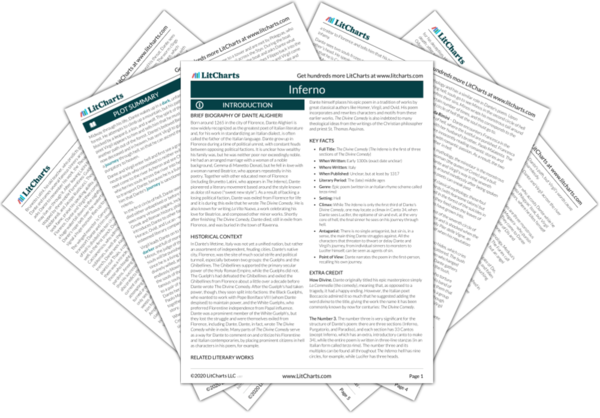Sin, Justice, Pity and Piety
As it narrates a journey through hell, Dante's Inferno is essentially a tour of all kinds of different punishments for different sins. It is filled with spectacular, unbelievable, and grotesque punishments, but these punishments are not meant merely to deter others from sinning. Dante's poem aims to show that such punishment is a complement to sin, completing or "perfecting" it. Thus, all of the punishments in Dante's vision of hell are always fitting, corresponding in…
read analysis of Sin, Justice, Pity and PietyPaganism vs. Christianity
Dante's epic poem is obviously a deeply Christian work. One might be surprised, then, to find that it is filled with allusions to pagan mythology and is populated not just by biblical figures, but also by characters of Greek and Roman myth and history. Perhaps the most important character after Dante is, after all, a pagan: Virgil. But despite how strange this might seem to us, this is actually a common occurrence in the…
read analysis of Paganism vs. ChristianityIndividual Fame
Dante repeatedly stresses the importance of fame throughout his epic poem. Souls often ask Dante to remember their names and to speak of them on earth, and several times Dante promises to do this in return for information. Probably the most repeated scene in the poem is that of naming or identifying. Virgil and Dante are often asked to name themselves, and they themselves continually point out, identify, and ask about individual sinners. Some of…
read analysis of Individual Fame
This World vs. the Afterlife
Throughout the Inferno, there is a tension between the earthly world we inhabit while living and the next world we inhabit in the afterlife. Dante is remarkable to so many spirits of the underworld because he is able to transgress this boundary and journey through hell as a living, earthly soul. Dante is in the unique position of being able to go to hell and back, and can therefore communicate things about the underworld…
read analysis of This World vs. the AfterlifeLanguage
Words and language have an almost magical power in the Inferno. Dante's words often stir souls to speak and share their stories, while Virgil's words move demons and other obstacles out of their way, as they journey through hell. At the gate to the city of Dis, the angel that opens the gate does so merely by speaking. And finally, Dante's entire journey is able to happen because it is divinely ordained by the…
read analysis of LanguageLove
Love may not be quite as powerful as the word in the Inferno, but it is still a strong force in Dante's epic. Dante is allowed to make his amazing journey through hell because of how much Beatrice, Dante's beloved who is now in heaven, loves him. She left heaven because of her love for Dante, to tell Virgil to guide Dante through hell. And as Dante traverses through hell, he is continually…
read analysis of Love






